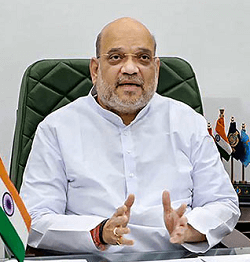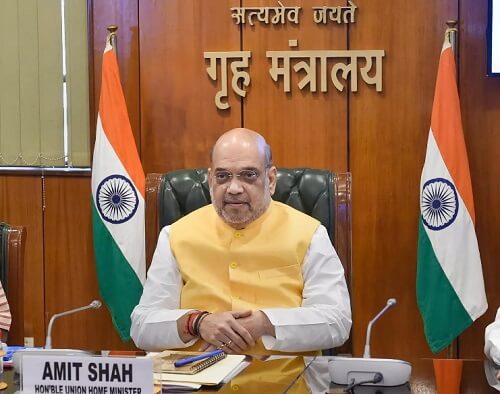Amit Shah
Amit Shah is Minister for Home Affairs and Minister for Cooperation and has been elected as Lok Sabha Member from Gandhi Nagar. He was President of the B.J.P. from the year 2014-2020. He was also a chairman of the National Democratic Alliance since 2014. He comes with having vast political experience. Before becoming Cabinet Minister, He was Minister in Gujrat Government from 2002-2012. He became Minister in the Centre when B.J.P. claimed a landslide victory in General Elections 2019. He is described as 'Chanakya' of Elections. He was instrumental in B.J.P. Victory in Gujrat. He was earlier elected to Rajya Sabha in 2017 from Gujrat. Brief Introduction
Physical Statistics and Body Measurement
Favourites
Family and Early LifeHe was born on 22 October 1964 in Mumbai. He comes from Hindu Family. His family had a P.V.C. pipe business, and his father, Anil Chandra Shah, was a businessman from Mansa. He did his schooling at Mehsana and later graduated from CU Shah Science College in Biochemistry. Later, he also worked in his father's business. He had tried his hands in the fields of stockbroker and Co-Operatives Bank in Ahmedabad. 
Shah was a member of ABVP during his college days, and ABVP is a student union of Rashtriya Swayamsevak Sangh. ABVP is an extension of the Bhartiya Janta Party. After working in ABVP, he later joined the Bhartiya Janta Party in 1987. He became M.L.A. in 1997 through a by-election result. He continued to be M.L.A. from Sarkhej till 2007. He later got elected from the Naranpura seat in 2008. He was a close aide to the then Chief Minister and held several ministries in Modi Government from 2002-2012. His prominence rose to a much higher level in the party. He was given charge of Uttar Pradesh, a sensitive and politically important state, to achieve electoral victory in the General Lok Sabha Elections. He was instrumental in making a clean sweep of Lok Sabha seats, winning 73 seats out of 80. After that, he was rewarded with the presidentship of B.J.P. After becoming President, B.J.P. won many legislative assemblies in Assam, Jharkhand, Jammu and Kashmir, Maharashtra, and Haryana. Several setbacks also came in losing the Delhi and Bihar Assembly Elections in 2015. There were also many victories when Shah was President, and his party won states like Uttar Pradesh, Uttarakhand, Gujrat, and Manipur. Mother of all victories was in the 2019 General Election when B.J.P. won whopping 303 seats to form government at the Centre. He got attached to Rashtirya Swayamsevak Sangh from childhood and joined neighbouring Shakhas. He met with Narendra Modi in 1982 through Sangh Programs. At that time, Modi held charge of Pracharak and propagated the message of the Sangh. He joined ABVP as a student leader; it was his first step toward entering politics. He has risen from the grassroots level from an activist in B.J.P. Yuva Morcha and then ranks of ward secretary, taluka secretary, state secretary, vice-president, and General Secretary. He was known for his organisational skill, and he was in charge of the LK Advani Lok Sabha Seat and campaigned for him. Gujrat had its first non- Congress Government in 1995. Keshubhai Patel from B.J.P. became non-congress Chief Minister of the State. Indian National Congress had a strong presence in rural Gujrat. Both Shah and Modi made an endeavour to lower the presence of I.N.C. in rural Gujrat. He empowered local leaders at the rural level and convinced them to join B.J.P. Through this program, 8000 local leaders joined the B.J.P. The same strategy was used in Cooperatives to reduce Congress's powerful presence. Cooperatives play an important role in Gujrat Economy. After giving sleepless nights to Congress, Shah was made President of Ahemdabad District Cooperative Bank. Caste was a major factor in the election, and powerful caste at that time were Patels, Kshatriyas, and Gaderias. Shah did not belong to any of these cases, but still, he won the election. Bank was in bad condition, incurred a loss of Rs 36 crores, and was on the brink of collapse. But Shah turned the picture completely in one year, and that year Bank made a profit of Rs 27crores. He also made that majority of directors should be B.J.P. loyalists. So, there were 11 directors out of 22 who were loyal to the B.J.P. They turned their focus toward Sports bodies largely dominated by Congress at that time. Modi, at that time, had become general Secretary of the B.J.P. Gujrat in the early 1990s. He used his power to get an important place for Amit Shah. Shah became Gujrat State Financial Corporation as Modi insisted Patel for Shah for this job. Keshu Bhai Patel was the Chief Minister of the Gujrat. Seeing the rising influence of Modi in the Party, some senior party leaders like Shankarsinh Vaghela and others raised the issue with central party leadership that Modi is using its influence in the government. Due to this, the leadership moved Modi to Delhi B.J.P. headquarter. At that time, Amit Shah acted as a close aide to Modi. Modi used his influence from Delhi to get Assembly seats for Shah in a by-election from Sarkhej. In 1997, Shah became an M.L.A. from the seat and improved his victory margin in subsequent assembly elections. A moment came when Keshubhai had to face serious charges of inefficiency, and subsequently, he had to resign from the Chief Minister post. Narendra Modi replaced Patel as the Chief Minister of Gujrat. Shah contested from Sarkhej seat in 2002 and won with a huge margin, and subsequently, he also fought election from Sarkhej seat and improved his Victory margin. During Modi's Government, Shah used to be seen as the most powerful person in the Gujrat. He was the youngest in the Cabinet and was provided with 12 Ministries. U.P.A. The government announced that they would repeal the Prevention of Terrorism Act. Then Shah introduced another Law called Gujrat Control of Organised Crime despite an Opposition walkout from the Assembly. Shah persuaded Modi to pass the Anti-Conversion Bill and made a very stringent provision for Religious Conversion. Amit Shah's Entry into National PoliticsB.J.P. announced Narendra Modi as the Prime-Ministerial face of his party. After that, Shah's prominence rose in the decision-making of the party. Many senior party leaders alleged that this duo side-lined them. At that time, Shah had become quite powerful in his party and was made General Secretary. He was given charge of Uttar Pradesh Lok Sabha Seats. Rajnath Singh was B.J.P. President was fascinated by Shah's ability to fight and strategy making. But this decision was not liked by all due to pending criminal charges against him, and political analysts termed it a big blunder. Game-Changing MomentShah's Career started to decline when he was detained in 2010. In politics, he came back very strong, having a resounding victory in the 2014 Uttar Pradesh General Elections. He was given charge of Uttar Pradesh Lok Sabha Seats. His party won 73 seats out of 80. He was given UP on 12 June 2013. He has spent large portions of time in UP, where he tried to understand the weaknesses and strengths of the Samajwadi Party. He sensed that S.P. had not kept his promise after winning the poll. Dissatisfaction is present among the voters, and he tried to harvest these issues. Reservation is one factor, and Shah tried to reap this sensitive issue. Shah was involved in every aspect related to UP, and he was involved in the selection of candidates. He made it simply clear that winnability is the criteria for candidate selection. He campaigned in every Lok Sabha Constituencies except a few of them. He created a special team dedicated to Lok Sabha elections management in UP and has to maintain the minute aspect of the election. He carried out massive Rath Yatras and reached out to the masses. He toured every nook and corner of the UP and connected with the people. He persuaded Modi to fight the poll from Varanasi. However, Modi contested two Lok Sabha seats, Vadodra and Varanasi, in 2014. He also involved Local Leaders in the transportation of people to the rally venue. He also played a key role outside the UP and alliances with various regional parties. In July 2014, Amit Shah was appointed as B.J.P. President by B.J.P. Central Parliamentary board, and he was unanimously elected. Subsequently, Shah was re-elected as President in 2016 unanimously. He launched a membership drive to expand his party base and ideology. As B.J.P. chief, his party gained massive victory in Uttar Pradesh, Maharashtra, Haryana and Jammu & Kashmir, Jharkhand, and Assam. But setbacks also came in the form of losing the Delhi and Bihar assembly elections. Shah's efforts made B.J.P. win the Uttar Pradesh Assembly election with a three-fourth majority. It was said to be the mother of all victory in his basket. His victory celebration also got tripped when his party won the polls in Manipur and Uttarakhand in 2017 along with UP. B.J.P. also regained Gujrat and has been in power since 1995. Shah gave a massive target to his party workers to cross 300 plus seats in the Lok Sabha election in 2019. Indeed, his party crossed, winning 300 plus seats in the Lok Sabha election. He changed the political landscape of the country. This made him one of the most successful presidents in the history of India. He was called to be modern-day "Chanakya". Chanakya was the person in Ancient History who replaced Nanda Dynasty with Chandragupta Maurya. Role as a Cabinet MinisterAfter the 2019 landslide victory in General Elections, he took oath as Cabinet Minister for Home affairs. As Home Minister, he introduced one of the much-debated bills, the Abrogation of Article370 and 35-A. He made a special effort for the Maximum Party supports the bill in the House. But to his surprise, many opposition parties came forward to support the bill barring a few oppositions who walked out of the House in protest. He also ensured that no unfortunate event should occur in the valley. He lockdown the State, and stringent security measures were put in place so that no mishap could happen. But he was also criticized for snatching the right to protest. Shah, in an event, said that Hindi should be promoted in the country and could be a source of unification. According to his Shah Website, he is a devout Hindu. In 2019, he introduced Citizenship Amendment Bill in Parliament, and subsequently, the protest started all over the country. This bill provides citizenship to persecuted Hindus, Sikhs, Buddhists, Jain, Parsi, and Christian who have illegally migrated to India; they are eligible for Citizenship in India. It provides an easy way for the person of these communities for citizens of India. They are persecuted in majority dominating Muslim countries where these communities are in the minority. After the 1971 war, their ethnic communities and culture are on the verge of extinction due to the influx of people from Bangladesh and Myanmar. The northeast was most disturbed by this bill. It set staged the protest all over India. However, the government remains unmoved with its stand. They remained firm and continued to support this bill after facing massive protests. Some parts of the country also reported the act of Violence. He also withdrew protection of S.P.G. from the Gandhi Family and provided them with Z+ security cover with Advanced Liasion. Critics point out that the government is run by just two people- Amit Shah and Narendra Modi.
Next TopicSavitribai Phule
|
 For Videos Join Our Youtube Channel: Join Now
For Videos Join Our Youtube Channel: Join Now
Feedback
- Send your Feedback to [email protected]
Help Others, Please Share










